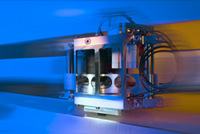Tyre Manufacturer Continental in Co-operation With Universities
HANOVER - September 3, 2008: Continental co-operates with universities in an extensive range of projects. The universities carry out fundamental research and also work on product-oriented projects. The partnership reaps benefits for the universities, for Europe's leading tyre manufacturer, as well as for motorists.
Private finance boosts universities' research conditions, creating more jobs for Ph.D. students; the accelerated fundamental research and product development benefits the industry, and tyres with better road-adhesion properties or offering longer mileage, for example, become available to motorists more quickly. At present, the Hanover-based tyre manufacturer is working on a variety of different projects with university institutes in Germany, France, Italy, Austria, Sweden and Slovakia.
Continental's Research & Development Department (R&D) has forged a series of partnerships with universities; its main links in Germany are with Karlsruhe, Göttingen, Hanover and Dresden. The industrial and research sectors have teamed up on a number of projects. For example, research is under way at the Leibniz University in Hanover into adhesion to snow and ice; new types of metal oxides are being used to make tyres last longer, and the simulation of tyre/carriageway noises in Hanover and Gothenburg has promised a further reduction in potential sources of traffic noise before the first prototype of the tyre is made. Experts in Dresden are looking at ways of improving the vulcanisation of tyres, whilst research into new polymers is ongoing in Göttingen. The performance of winter tyres on snow and ice can be tested all year round on the roller drum test rig at the University of Karlsruhe, simulating realistic conditions of use and set to any temperatures. New tests on wearing mechanisms are set to follow soon.
Explaining the nature of the cooperation, the programme manager, Dr. Thomas Becherer, points out that "these types of co-operation are highly advantageous both to the universities and to us. Private finance initiatives, which also produce attractive projects for universities to be involved in, are becoming increasingly more important nowadays. These contracts also boost the institute's internal standing within the university. This frees up the 1,200-strong staff in Continental's R&D department to work on other projects, thereby facilitating significant gains in time." The cooperation arrangements also include doctoral theses and dissertations, as well as various other projects.
The actual research findings are not the only benefit; the reciprocal exchange of expertise between specialists within and outside universities is also positive. "It opens up new source of incentive for our work; sometimes they cannot be exploited straight away, although they promise future success," says Dr. Becherer. The exchange of personnel with the universities is also of interest to both sides. For example, Continental has managed to recruit an array of young employees straight from the projects. Conversely, some of the company's staff have also made from the switch from industry to academic life. As Dr. Becherer is only too aware, "it is a pity, of course, to see specialists move back into research. However, the contacts remain. For instance, one of our colleagues moved to the University of Karlsruhe some time ago to further his own research work. He took a number of projects with him that he is now continuing to work on with us, along with his degree and Ph.D. students. However, the cooperation is not restricted to research orders. This colleague has also developed a trend-setting form of cooperation between research and industry. Applying Continental's project management rules, students on one of his courses are working on current topics which are stipulated by us. This course is fully subscribed every semester, and my colleagues are thrilled with the results."
Continental has a long tradition of co-operating with universities on tyres. Joint projects were embarked upon and carried out back in the 1980s. The collaboration has now become par for the course for both sides, something which Dr. Becherer says they want to develop further.



